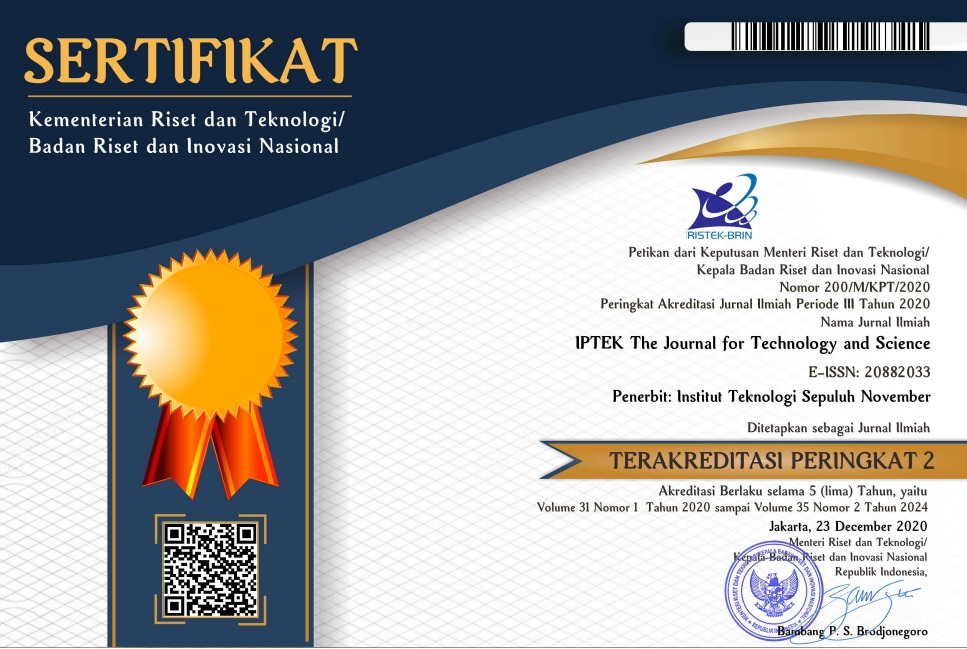The Effect of Substrate Types to FAME Conversion on Acid-Catalyzed Transesterification of Crude Rice Bran Oil
Abstract
Keywords
Full Text:
PDFReferences
Rachmaniah, Orchidea, Yi-Hsu Ju, Shaik Ramjan Vali, and M. Rachimoellah., “A Preliminary Study of The Potential of Rice Bran Oil as Biodiesel”, Proc. International Seminar & Exhibition Ecological Power Generation: Biomass-Coal Utilization & Fuel Beneficiation, pp. 1-10. 2005.
Rachmaniah, Orchidea, Yi-Hsu Ju, Shaik Ramjan Vali, Ismojowati Tjondronegoro, and Musfil A.S., “A Study of Acid- Catalyzed Transesterification of Rice Bran Oil as Biodiesel Production”, Proc.Youth Energy Symposium, 19th World Energy Congress & Exhibition. 2004.
Freedman,B., E.H. Pryde and T.L. Mounts. , “Variables Affecting the Yields of Fatty Esters from Transes terified Vegetable Oils”, J. Am. Oil Chem. Soc., Vol. 61, pp.1638-1643. 1984
Fukuda, H., A. Kondo, and H. Noda., “Biodiesel Fuel Production by Transesteification of Oils”, J. Biosci. Bioeng., Vol. 92, pp. 405-416. 2001.
Ma, F. and M.A. Hanna., “Biodiesel Production: A Review”, Bioresour. Technol., Vol. 70, pp. 1-15. 1999
Canakci, M., and Gerpen, J. Van. , “Biodiesel Production from Oils and Fats with High Free Fatty Acids”, Transactions of the ASAE., Vol. 44, pp.1429-1436. 2001.
Zhang, Y., Dube, M.A., McLean, D.D., Kates, M., . “Process design and technological assessment, Bioresour Technol”, in Review paper 2003 Biodiesel production from waste cooking oil: 1., Vol. 89, pp.1-16. 2003.
Kaimal, Thengumpilil Narayana Balogopala, Shaik Ramjan Vali, Bhamidipati Venkata Surya Koppeswara Rao, Pradosh Prasad Chakrabarti, Penumarthy Vijayalakshmi, Vijay Kale, Karna Narayana Prasanna Rani, Ongole Rajamma, Potula Satya Bhaskar, Turaga Chandrasekhara Rao., “Origin Problems Encountered in Rice Bran Oil Processing”, Eur. J. Lipid Sci. Technol., Vol 104, pp. 203-211. 2002.
Khan, Adam Karl., “Research into Biodiesel Kinetics and Catalyst Development”, Master Thesis., University of Queensland, Australia. 2002.
DOI: http://dx.doi.org/10.12962/j20882033.v18i3.169
Refbacks
- There are currently no refbacks.
IPTEK Journal of Science and Technology by Lembaga Penelitian dan Pengabdian kepada Masyarakat, ITS is licensed under a Creative Commons Attribution-ShareAlike 4.0 International License.
Based on a work at https://iptek.its.ac.id/index.php/jts.


